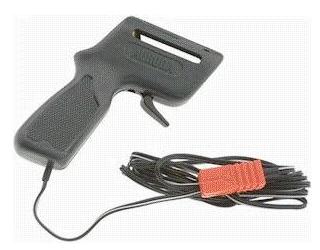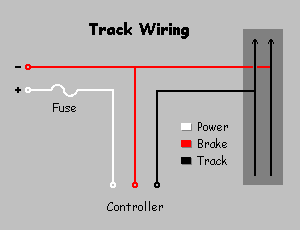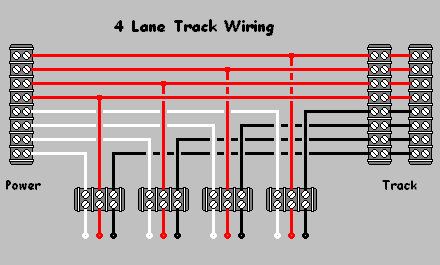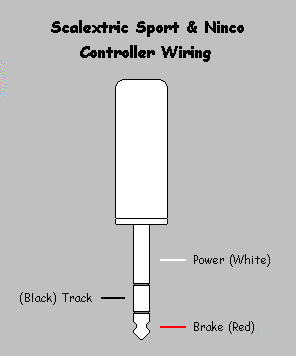One of the weakest parts of most HO Slot Car Racing sets most certainly has to be the hand controllers supplied in these boxed sets.

High-quality replacement hand controllers are available for $38 dollars. These after-market controllers are not only made much better than the small set controllers, they also include motor braking.
These replacement controllers are also quite a bit larger and will fit in your hand better than the smaller set controllers.
Motor Braking
Motor braking will allow your slot car to stop much more quickly. Normally, without motor braking, your slot car will continue to roll after power is removed from the motor, but with a motor braking circuit your slot car will stop much faster. This will allow you to drive deeper into a turn before slowing.
Any slot car track can easily be wired for motor braking using the track wiring diagram below.

The red brake wire leading from the driver’s station to the negative power rail in the illustration above is all that is required to add a motor braking circuit to your HO Slot Car Track. See the Power section of this web site for more information about wiring a track for brakes.
The wiring diagram below illustrates a typical track wiring scheme for a simple 4-lane slot car track employing motor braking.

The principle behind motor braking is quite simple actually. Normally, a DC motor will spin freely when power is removed. Motor braking involves placing a shunt across the commutator poles to increase its turning resistance, and thus slowing its armature.
If you elect to install motor braking circuits on your slot car track you can easily defeat them by simply leaving the red brake wire on your hand controllers unconnected. This will allow you to run with or without the benefits of motor braking. You will find the effects of motor braking to be quite beneficial though, and will probably want to race with them in the circuit.
Controllers with Stereo Plugs
Several 1:32 scale race sets now include 3-wire 1/8″ stereo mini-jacks for hand control connections. The diagram below illustrates the plug wiring as used by both Scalextric Sport and Ninco for their set hand controls.
Most commercial slot car tracks built in the 1960s used 1/4″ Stereo Phone Plugs, but this practice was quickly abandoned because when the hand control was plugged in or removed it created a momentary short while the plug slid out of the jack. Modern 1:32 scale track manufactures all warn users to make sure the power pack is unplugged before inserting or removing a controller plug for this very same reason.
Controller Impedance
Commercial after-market slot car hand controllers come in a variety of resistor sizes. Hand controllers built specifically for HO Slot Car Racing are normally rated at 60, 45 and 25 ohms of electrical resistance, or impedance to current flow.
The hand controllers supplied in most boxed race sets are rated at approximately 60 ohms.
You may find however that replacing the stock 60 ohm hand controllers with lower impedance units in the 45 ohm range makes for better car control.
A properly selected hand controller should allow your slot car to slowly creep away when the trigger is squeezed just a fraction of an inch. As you continue to squeeze the trigger the car should accelerate in a linear fashion throughout the controllers trigger range.
If your hand controller behaves more like an on-off switch than a variable throttle control you have selected a controller with too low of an impedance rating.
The chart below describes recommended hand controller impedance ratings for the various types of HO Slot Cars and motors currently available:
90 Ohm – Model Motoring Thunderjets
60 Ohm – Aurora A/FX & Auto World
45 Ohm – Stock Tomy AFX, Life-Like & Tyco Cars
25 Ohm – Modified Tomy AFX and Tyco Cars
15 Ohm – Open and Highly Modified Motors
A good quality 45 ohm hand controller will work with just about all of the slot cars listed above except those with open or highly modified motors.
If you are only going to buy one set of hand controllers to replace your boxed set controllers the 45 ohm rating is probably your best bet. It will have a wide enough control range to smoothly drive everything from a Model Motoring Thunderjet to a modified Tyco or Tomy AFX slot car.
Note: The resistors used in most of the better slot car hand controllers are easily replaced. You can always replace the current power resistor with a different rating if your tastes or needs change.
1:32 Scale Racers
Recommended power resistor impedances for 1:32 scale racing differ slightly from HO slot cars. The list below describes the various uses for 15-45 Ohm Controllers:
45 Ohm – Home Set Cars on Small Tracks
35 Ohm – Home Set Cars on Medium Tracks
25 Ohm – Home Set Cars on Large Tracks
15 Ohm – Hot Motors on Large Tracks
Home Set Cars such as those produced by Scalextric, Ninco, FLY and Carrera generally work best with a 45 Ohm Hand control on smaller tracks with short straights. As the size of a track increases, i.e. longer straights, the power resistor impedance can be lowered. A 25 Ohm control will work best on home tracks in the 6×12 to 8×20 foot range.
Hot Motors such as the ProSlot EuroCan, TSFR and NSR Boxers work well with a 15-25 Ohm control on large tracks with long straights. Slot.It and FLY Racing motors, while considered hotter, still work well with a 25 Ohm control on larger tracks.
Parma Hand Controls
Parma is currently out of stock on the trigger assembly required to build Economy controllers. It may be some time before Economy controllers are available again.
In the interim I recommend the Aurora A/FX Adjustable control instead. It has a full sized handle that fits an adult’s hand and is adjustable from 35-70 ohms. It includes a red brake wire just like the Parma.
View Aurora AFX Adjustable Control in Pop-Up Window Aurora AFX Adjustable Control $17.99
Add Aurora AFX Adjustable Control to Shopping Cart
Parma is without question the premier manufacturer of after-market slot car hand controllers. Parma has been building controllers for all scales of slot car racing for over 35 years.
Replacement parts for Parma hand controllers are inexpensive and widely available. The wide availability of replacement parts should not be underestimated. While these controllers are very well made and can easily last a lifetime, they will from time to time require maintenance.
Parma makes several different models of hand controllers from their entry level Economy line up to their TQ or Turbo Qualifier models. All are well made and will easily stand up to many years of use.
The Parma hand controls and parts described below can be purchased using the Add to Cart buttons displayed to the right of the various controls are parts.
Economy Controller
Parma’s entry level hand controller, the Economy line is suitable for all types of HO Slot Car Racing. This is a well made hand controller and should stand up to many years of use.
Parma’s choice of the name “Economy” for this line of controllers is unfortunate. A better name would have been “Standard”, as these are well made controls that will last a life-time, and should they ever need repair, replacement parts are readily available.
The Parma Economy hand controller uses a single-barrel wire-wound power resistor, and a completely enclosed controller body. The handle is molded in tough Lexan, so if they do hit the floor they won’t break. You could even step on the handle without damaging it!
Plus Controller
The next step up in the Parma hand controller line is the Plus Controller. This model includes an internal aluminum controller frame, heavy-duty power resistor, 14 gauge hook-up wires and a nylon trigger and brass wiper assembly. The aluminum frame acts as a heat sink to aid in the cooling of the power resistor.
Turbo Qualifier
The Parma Turbo Qualifier is the top of the line. Along with all of the features of the Parma Plus described above, this controller adds a double-barrel wet-wound power resistor, heavy-duty 14 gauge hook-up wires and a finned aluminum power resistor heat sink.
Parma Turbo Controller Kit
Parma also offers a Turbo Controller Kit. This model is one step up from their standard Plus model. The kit includes all of the parts required to build a Turbo controller less the power resistor. A wide range of Turbo Power Resistors in various power ratings are available. Turbo resistors are dual-wound ceramic-core parts with an opening in the upper core for an optional Finned Heat Sink like the one used on the Turbo Qualifier.
Parma Repair Parts
A good variety of Parma repair parts aside from just power resistors are also available. Colored handles, triggers, wire, and alligator clips round out the selection.
Turbo EC Controller
The newest products in the Parma hand controller line are the Turbo EC Electronic Controllers. These models incorporates true solid state high frequency pulse width modulation (PWM) to provide precise control of any slot car motor from H.O. to 1:24 scale.
Unlike many so-called electronic hand controls that simply use diodes to replace the power resistor, the Parma Turbo EC control automatically adjusts to the motor itself.
This new generation of hand controls entirely does away with the impedance ratings standard hands controls employing a power resistor require. One control can now be used to control any slot car motor regardless of it level of tune or size.
The Turbo EC includes an integral fuse for protection and an on/off switch for dynamic motor braking.
The Turbo EC Plus version includes all of the features of the Turbo EC Basic model described above along with adjustable braking bias and trigger sensitivity.
Turbo EC Re-Design
The initial Parma Turbo EC hand controls, while being a good design electronically, didn’t stand up well to actual use. Parma has plans to re-design the control and then release a new version in the future. It’s been some time since they made their announcement to re-design the EC units, but so far nothing has emerged. For the foreseeable future their Economy, Plus and Turbo Qualifier controllers are your best choice.
If you do happen to find a Parma EC controller on a dealer’s shelf keep in mind that it is one of the original controllers and may fail after a short period of use.

